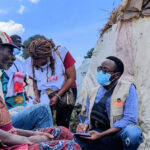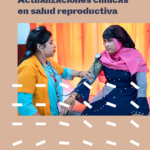

Ipas is proud to continue supporting community-based efforts to advance reproductive justice with the unveiling of 16 new recipients of the Ipas Collaborative Fund for 2024.

No matter the cause, humanitarian crises often mean an increase in sexual and reproductive health needs—yet access to safe abortion remains one of the most forgotten of those needs. Ipas Democratic Republic of Congo is making sure that access to abortion is included in humanitarian aid response to the devastating armed conflict in North Kivu.


The United States is violating human rights by denying legal access to abortion—and should take immediate action to end the criminalization of abortion at the federal, state and local levels. This is the newly released conclusion of the United Nations Human Rights Committee in response to testimony from Ipas and partners in October.


La publicación de Ipas titulada Actualizaciones clínicas en salud reproductiva contiene recomendaciones clínicas actualizadas, basadas en evidencia, sobre la atención integral del aborto, así como nuevos temas y recursos agregados con regularidad. Actualizaciones clínicas en salud reproductiva ofrece información concisa y fácil de leer sobre los servicios de aborto, y combina las evidencias más recientes con lecciones aprendidas de profesionales de la salud a nivel mundial para producir recomendaciones clínicas pertinentes.

Climate change is hitting Malawi hard. In recent years, torrential rains, destructive winds and mudslides brought on by a series of cyclones have had a devastating impact on the country’s people and its agriculture-based economy.

On November 17, 2023, the United Nation’s New York City headquarters will host a gathering of the Political Network for Values (PNfV), a major organizing nexus for the global far-right. Founded almost a decade ago, the benignly named PNfV has largely flown under the radar. In this time, the group has blossomed into a key networking hub and training ground for far-right activists and political leaders seeking to diminish or extinguish minorities rights and depreciate multilateral human rights systems—including the United Nations itself.

